Watch: Mia deFaoite, survivor/activist, speaks at the event marking the successful completion of the Turn Off the Red Light campaign:
10 March 2017, International Women’s Day
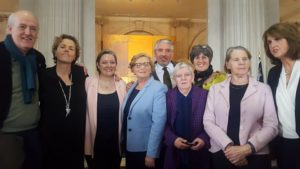
TORL partners and political leaders at event to mark passing of legislation
Partners of the Turn Off the Red Light campaign come together in City Hall alongside leading political champions for the Sexual Offences Act 2017 to mark its passing into Irish law as a step forward for equality and efforts to tackle sexual discrimination and violence. The event heard from Irish survivors of prostitution including Mia deFaoite and Rachel Moran, Chair of the Turn Off the Red Light campaign Denise Charlton and Tánaiste and Minister for Justice and Equality Frances Fitzgerald TD, who had introduced the legislation and championed its passage through the Irish houses of parliament.
This event marked the official end of the Turn Off the Red Light campaign, with the fulfillment of its goals.
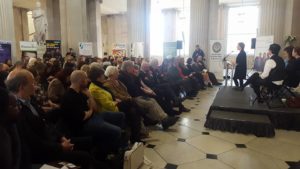
Attendees at City Hall event marking passage of the Sexual Offences Act
It was agreed that individual partners would continue to work together to ensure successful implementation of the legislation.
15 February 2017
The Sexual Offences Act 2017 was passed by the Irish Government, including laws as called for by the Turn Off the Red Light campaign.
The passing of the legislation was marked by partners both nationally and internationally and celebrated as an opportunity to tackle the harm and exploitation inherent to the sex trade in Ireland.
Early February 2017
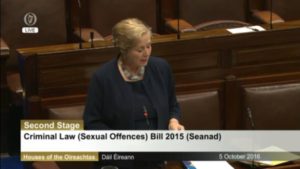
Tánaiste and Minister for Justice and Equality Frances Fitzgerald TD reintroduces the Bill to debate
An amendment to the legislation introduced by a minority of opposition members of Government which would have removed all aspects relating to prostitution is voted down. Many leading political figures spoke out in favour of the proposed laws as they stood, and in support of the model to decriminalise the sale of sex while criminalising the purchase.
December 2016
Campaign partners engage in advocacy activities to highlight the need for
decriminalisation of the sale of sexual services to be an intrinsic part of any legislation tackling the sex trade, in recognition of the vulnerability of the majority of those involved and the responsibility of the State to offer alternative means of self-sufficiency for those impacted.

European partners supporting TORL
The legislation is heard at Committee Stage, where it is passed including amendments successfully decriminalising the sale of sexual services. A proposed amendment decriminalising brothel keeping fell, as it was understood that this was more likely to be taken advantage of by those controlling women.
Instead it was suggested that a policing code of practice could be developed to ensure that prosecutions would follow the exploitative, controlling and abusive elements of the trade including pimps, buyers and traffickers.
November 2016
The Sexual Offences Bill passed Second Stage in the Dáil and is referred to the Joint Oireachtas Committee on Justice and Equality. Inputs from TDs were largely positive, with individual members of parliament highlighting the extent of evidence of criminal groups controlling the trade who were personally targeting anyone speaking out against it. Questions were raised about the need for increased supports to women in prostitution or wishing to exit, and noted the need for explicit decriminalisation of anyone selling sexual services.
October 2016
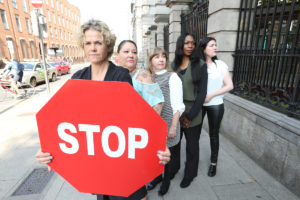
Members of TORL and SPACE Intl at survivor event
A Survivor’s Event was held by Turn Off the Red Light with partners from SPACE International, and organisation by and for survivors of the sex trade. Speakers came from Ireland, Canada, the United Kingdom and USA, and was attended by a broad range of civil society representation and political leaders. The event was timely with the imminent scheduling of the legislation, and a great opportunity
The Sexual Offences Bill returned at Second Stage in the Dáil, where Government debate remained focused on those elements of the legislation relating to prostitution and sex trafficking. Cross-party support for progress was apparent.
January 2016
The Sexual Offences Bill finished at Second Stage in the Seanad, the first of three stages before the Bill can be enacted. Statements of support for the Bill were made by all four leading political parties.
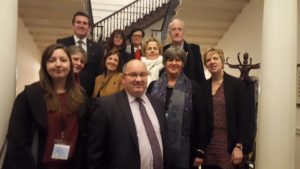
TORL partners with Senators marking progress of the legislation
As it stands the Bill includes laws to criminalise the purchase of sex, while explicitly decriminalising the sale of sex.
December 2015
The Sexual Offences Bill is debated at Second Stage in the Seanad.
An amendment was proposed and accepted at Committee Stage to include explicit decriminalisation of the sale of sex, as is consistent with the Swedish Model, to ensure that the most vulnerable in the sex trade do not face prosecution. This is in addition to the criminalisation of the purchase of sex.
An Admobile with information about the campaign and reality of sex trafficking in Ireland traveled around Dublin, stopping in notable politically relevant areas. Partners spoke to the public about the campaign, and the event was used as a point for media engagement.

TORL admobile in Dublin city centre
October 2015
Representatives from the campaign traveled to Westminster, London for an End Demand calling on English politicians to follow Ireland’s lead in calling for sex buyer laws.
Local activists attend a talk on prostitution in Ireland by TORL Coordinator Catriona Graham, followed by a screening of the Price of Sex. Local events were a cornerstone of the campaign, ensuring a national public awareness approach leading to local political engagement on the issue.
April 2015
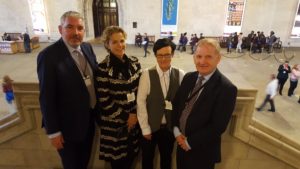
Members of TORL in Westminster with British MP
Minister for Justice and Equality Frances Fitzgerald and Northern Ireland Justice Minister David Ford attended and spoke at the launch of the #wedontbuyit Campaign. The campaign is part of the REACH Project to raise awareness of sex trafficking. Several high profile men were also involved in the launch of the campaign, which aims to promote a message of zero tolerance towards men purchasing sex.
November 2014
The campaign progresses as Minister Frances Fitzgerald announces 27 November 2014 that she is looking to introduce the criminalisation of the purchase of sexual services into the Sexual Offences Bill.
Campaign partners are encouraging local politicians to support the minister’s decision as it is a welcome step in ending the violence women involved in prostitution and sex trafficking endure.
October 2014

Survivor Mia de Faoite speaks in support of legislation on national Primetime show
At an EU Anti-Trafficking Day event hosted by the Immigrant Council and attended by many TORL partners, Ireland’s Minister for Justice and Equality, Frances Fitzgerald, supports ending prostitution and sex trafficking via criminalising the buyers of sex: “If the demand for the services of victims can be reduced, and hopefully eliminated, the business model of trafficking can be significantly undermined.”
Northern Ireland passes a law criminalising sex buyers with a vote of 81-10.
September 2014
A Child Grooming Bill was developed by Deputy Corcoran Kennedy that proposes up to 14 years imprisonment for those exploiting children, following the TORL campaign recommendation.
Jimmy Carter addresses a letter to the Oireachtas Justice Committee urging members to consider legislation that criminalises sex buyers.
The Turn Off the Red Light campaign gains two more members, Tearfund Ireland and YWCA Ireland, totalling 72.
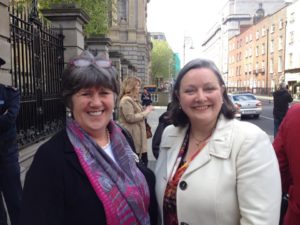
Ellen O’Malley Dunlop with Deputy Marcella Corcoran Kennedy, who introduced legislation to tackle grooming
June 2014
Canada passes a law to criminalise those who purchase sex.
May 2014
Turn Off the Red Light reaches 70 members as Cork Feminista and ASCEND Domestic Abuse Services Tipperary join the campaign. The coalition now has a combined membership of over 1.6 million people.
April 2014
The Parliamentary Assembly of the Council of Europe (PACE) votes in favour of a resolution entitled ‘Prostitution, Trafficking and Modern Slavery in Europe’.
The resolution passed with a large majority and recognised the inextricable link between the phenomena of prostitution and trafficking, and supports the sex buyer laws as a way of addressing trafficking and exploitation in the European sex trade. Critically, the resolution also called for resources to be devoted to ‘exit programmes’ for women seeking to leave prostitution, which would include counselling, legal and health services.
March 2014
 February 2014
February 2014
MEP Mary Honeyball’s Report on ‘Sexual Exploitation and Prostitution and its Impact on Gender Equality’ is passed by the European Parliament in a milestone for gender equality throughout Europe. The Report passed by 343 votes to 139, with 105 abstentions, and found that violence is inherent to the system of prostitution. It also pointed to the Swedish model as a successful approach to tackling trafficking, supporting women who are in prostitution, and changing the public mindset to one where purchasing sex is not acceptable.
December 2013
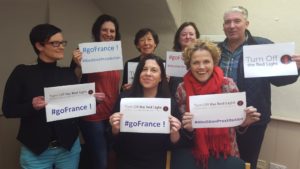
TORL partners celebrate the passing of the French law
The French National Assembly votes to enact a bill which would criminalise the purchase of sex, while removing laws criminalising solicitation. The bill must be approved by the French Senate. When enacted, purchasing sex will be a crime, subject to a fine of 1,500 euro for the first offence and 3,750 euro for further offences. The bill also includes measures to support women trapped in the sex trade and dedicates resources to exiting strategies.
The Supreme Court in Canada strikes down the country’s prostitution laws as unconstitutional, and gives the Canadian government a year to produce new legislation
October 2013
September 2013
June 2013
 eachtas Committee published its ‘Report on the Review of the Legislation on Prostitution in Ireland’, which unanimously recommended that a law should be passed criminalising people who pay for sex, along the lines of the Swedish model. The report made a series of other recommendations for legal reform including increasing penalties for trafficking for the purposes of sexual exploitation.
eachtas Committee published its ‘Report on the Review of the Legislation on Prostitution in Ireland’, which unanimously recommended that a law should be passed criminalising people who pay for sex, along the lines of the Swedish model. The report made a series of other recommendations for legal reform including increasing penalties for trafficking for the purposes of sexual exploitation.December 2012
July 2012
June 2012
February 2012
October 2011
July/August 2011
 Photographic exhibition ‘Not Natasha’ organised by the ICI and curated by FOMACS in Creation Arcade venue in Dublin. It featured images of girl survivors of human trafficking, their families and surroundings in their native Moldova. The exhibition attracted a wide audience and support for the TORL. Senators and other political representatives visited and expressed commitment to the campaign.
Photographic exhibition ‘Not Natasha’ organised by the ICI and curated by FOMACS in Creation Arcade venue in Dublin. It featured images of girl survivors of human trafficking, their families and surroundings in their native Moldova. The exhibition attracted a wide audience and support for the TORL. Senators and other political representatives visited and expressed commitment to the campaign.May 2011
Meeting with the UK Labour Party’s Shadow Minister for Women and Equalities, Fiona McTaggart. The meeting discussed the strategy behind the legislative step to protect women and girls in the sex industry and to reduce the demand in the UK. Meeting with Vera Baird QC (Solicitor General of the UK 2007-10).
Political briefing in Buswells hotel, attended by 42 politicians, among them three Ministers of State and the political advisors of Minister Pat Rabbitte and Minister Joan Burton.
April 2011
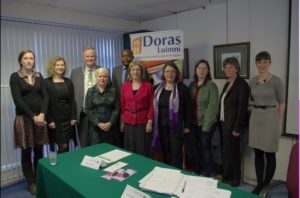
Limerick TORL launch with local members
March 2011
February 2011
February 2011
November 2010
September 2010
August 2010
June 2010
April 2010
April 2010
March 2010
- The Lord Mayor of Dublin hosts a meeting for TDs, senators and councillors at which the ICI and the Dignity Project presented their work and the demand campaign outline.
-
The Green Party annual conference discusses sex trafficking with ICI representatives on the panel, and positive and encouraging views were expressed on the upcoming campaign.
- Iceland bans lap dancing clubs and strip clubs.
-
ICTU passes a motion supporting the criminalisation of the purchase of sex in Ireland, and pledges to support the national campaign against demand in Ireland. This motion is adopted at the ICTU all-Ireland conference in Belfast.
February 2010
- Escort Ireland sends Valentine’s cards to local and national politicians asking them to support their petition for the legalisation of brothels. ICI responds in a letter to all politicians and received strong support from respondents.
-
Irish brothel-keeper TJ Carroll is sentenced on a number of prostitution-related charges, but not trafficking charges, in Wales. Submissions to the Court depicted a situation in Ireland which reflected the findings of the research, ‘Globalisation, Sex Trafficking and Prostitution: The Experiences of Migrant Women in Ireland’.
December 2009
End Prostitution Now campaign launched in Glasgow.
November 2009
- Sex Worker’s Alliance formally launched.
- Fine Gael Private Member’s Motion calling for review of the current prostitution laws, exploring the approaches in Sweden and in the UK. The Minister for Justice comments that the emerging public debate on the Swedish model is useful, encouraging the relevant Oireachtas committees to study the Swedish model, and link with the Dignity project.
- Dignity organise a national Conference with a focus on demand which includes a keynote from high-ranking Swedish police officer on law and its impact.
October 2009
January 2009/December 2010
September 2009
August 2009
June 2009
- The NACD (National Action Committee on Drugs) published a report analysing the experiences of women drug-addicts involved in street prostitution. The Sex Workers Alliance announces their support for the Legalisation of prostitution campaign.
- Conference ‘The Dilemma of Demand’ co-hosted by the Immigrant Council of Ireland and the Irish Human Rights Commission, attended by representatives of the police, the Department of Justice, the main domestic and international NGOs, and many foreign embassies.
- Senator Ronan Mullen brought a Private Member’s Motion for the Criminalisation of the Purchase of Sex.